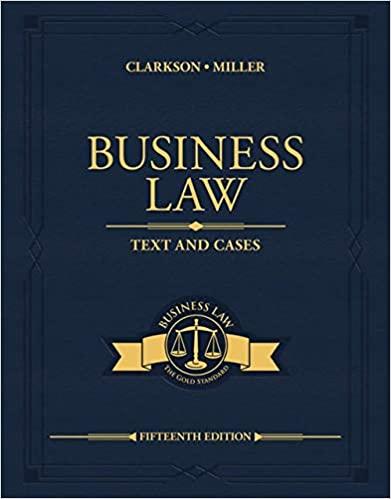Question
1. True or False It is the duty of the plaintiff suing a police agency to prove the affirmative defenses involved in the case 2.
1. True or False
It is the duty of the plaintiff suing a police agency to prove the affirmative defenses involved in the case
2. True or False
Contributory negligence is a defense that a law enforcement agency defendant can use in a lawsuit to prevent the plaintiff from collecting damage awards
3. True or False
In a lawsuit, parties cannot continue "discovery" (finding evidence by way ofdepositions, requests to produce etc...) after the jury renders a verdict and during theappeals stage of the case to bring up "new facts" to the appeals judges
4. In a case involving comparative negligence defense:
Is also known as contributory negligence defense |
| Involves the tory intentional torts |
| Involves the tort claim of negligence |
| all of the the responses are correct responses to the question |
5. When a police officer is sued civilly for excessive force under the intentional tort of battery it is:
Going to be decided on the basis of "beyond a reasonable doubt" |
| The plaintiff must prove that they were owed a duty of care by the police officer |
| The defendant must have "legal standing" for the case to proceed |
| None of these possible answers are a correct reponse to the question asked |
6. If a police department negligently conducts a citizen academy course in which one citizen participant is accidentally shot by a bullet by a participating police officer and sues and gets only 30% of her damages she is suing for, then most likely:
Absolute immunity exists to protect the police department and police officer being sued | |
Waivers were signed by the citizen participant | |
Comparative negligence defense is involved here | |
Contributory negligence defense is involved here |
6. When a plaintiff sues a police agency for negligence:
The "duty" element can be satisfied by the plaintiff by proving "actual causation" | |
The "duty" element can be satisfied by the plaintiff by proving "proximate causation" | |
The "duty" element cannot be satisfied by the plaintiff by proving a "public duty" owed by the police to the general public | |
All the above are true statements | |
None of the above are true statements |
Step by Step Solution
There are 3 Steps involved in it
Step: 1

Get Instant Access to Expert-Tailored Solutions
See step-by-step solutions with expert insights and AI powered tools for academic success
Step: 2

Step: 3

Ace Your Homework with AI
Get the answers you need in no time with our AI-driven, step-by-step assistance
Get Started


